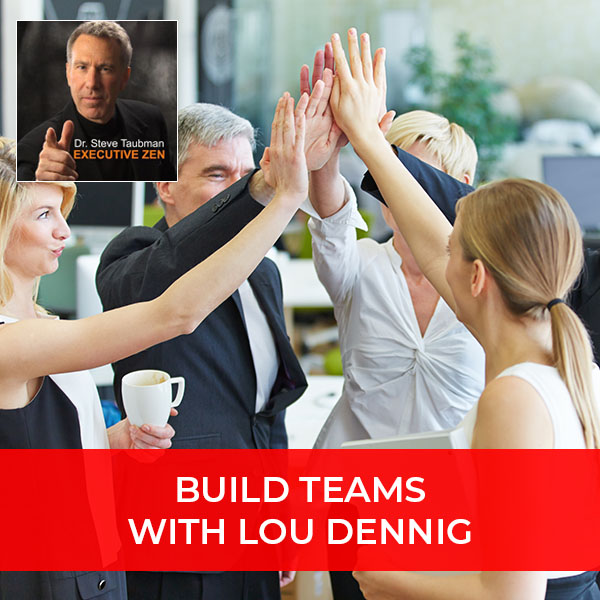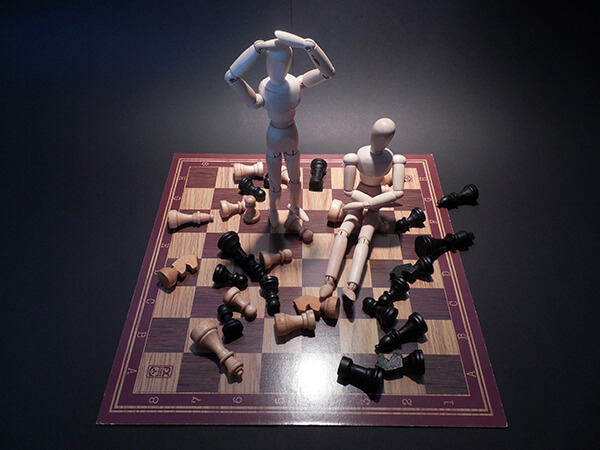

Join me and Emmy nominated producer, Lou Dennig talking about Developing Teamwork! Lou is a four-time Emmy nominated Executive Producer and Studio Executive who has influenced daytime television in some of the most significant programming content of the last two decades. Dennig is the man behind the gavel of some of the most successful Court Shows on TV including Judge Judy, Judge Joe Brown, Swift Justice with Nancy Grace, and DIVORCE COURT where he shot the show with authentic litigants in real time; an unprecedented achievement that cut post-production costs in half. In Dennig’s first season at DIVORCE COURT, the program delivered a 10% larger audience than the prior season and garnered an Emmy nomination. Throughout his illustrious career, Lou has relied upon his ability to build strong teams who work together to create magical outcomes. Join us as Lou shares his secrets for getting the most from a team!
—
Listen to the podcast here:
Build Teams with Lou Dennig
I am excited about our topic, which is about developing teams creating teamwork, being a team player, and being a leader of teams. We’ve got a guest with us who has a lot to say on the topic for a very good reason. He has a great background in a very prestigious industry. My personal relationship with the notion of teamwork has always been a little bit askew. I have to embarrassingly admit that I’ve tended to shy away from team activities. I was traumatized by the Little League. I was a young kid. I was out on the field and my dad wasn’t a baseball guy himself. I didn’t have a lot of homework on the topic. We’re playing a big game and we’re getting ready to finish up an inning in which we were about to take that. I was about to run out of the field and we lost the game, it was one of the later innings and we lost the game.
I just didn’t know it. I started running out onto the field to take my position. It took a while for anybody to inform me that the game was over and I didn’t belong out there. It was a humiliating experience at the age of seven. I tend to shy away from team sports. I did play soccer for a little while in high school. I wasn’t bad. I had some facility for it. The whole team thing escaped me a little bit. I have probably suffered for lack of wisdom and knowledge in that area because, in my work as a chiropractor for many years, I had people who worked for me. I had a team of people who are supporting my efforts. I learned a few things along the way, but I’m learning more now than I ever learned then.
I am so excited about this because as I’ve moved further and further into my shining area of life, where I do shine, where I do well, what I’ve begun to learn, see and believe is that nobody succeeds in a vacuum. Nobody can achieve ultimate success if he or she doesn’t know how to harness the power of the team, how to how to lift themselves and others up together, and how to appreciate the fact that you don’t know everything. I don’t know everything. I don’t have all the answers and I don’t have all the resources to be stellar at what I do. I’m beginning to learn that lesson a little bit. I’m assembling teams around me, advisory boards, a board of directors, people who are my team who do support my mission and whose mission I support. As time goes on, I think I’m growing up.
It took me a little longer than I would have liked and cared to admit. I’m very much down with this idea that how we behave in relation to other people and how we assemble teams, the way we empower other people and allow ourselves to be empowered by other people is directly proportional to our success. That’s the framework around this show. Interestingly, the guest I’m about to introduce you to has a lot to say on the area of teamwork and a lot to say in the area of authenticity. I’m hoping that we’ll actually be able to touch on both of those areas, both teamwork and authenticity. In prior conversations with him, I was just so delighted by who he was and his special spin on these topics. Hopefully, you will all get to hear all about that. I’ll be speaking with a well-respected expert in the area of business, in the area of media and therefore in the area of teamwork and authenticity.
—
I’m thrilled to be introducing my guest. Lou Dennig is a four-time Emmy-nominated Executive Producer and Studio Executive who has influenced daytime television in some of the most significant programming content of the last two decades. He is the man behind the gavel of some of the most successful core shows on TV including Judge Judy, Judge Joe Brown, and Swift Justice with Nancy Grace and Divorce Court where he shot the show with authentic litigants in real time, an unprecedented achievement that cut post-production costs in half. In Dennig’s first season of Divorce Court, the program delivered a 10% larger audience than the prior season and garnered an Emmy nomination. Throughout his illustrious career, Lou has relied upon his ability to build strong teams to work together, to create magical outcomes. Welcome, Lou Dennig.
Dr. Steve, I’m so happy to be here.
I’m so glad you’re with us. Thanks for taking the time out of your busy day. I know you’re a busy guy and you’re on the road a lot. You heard about my little rap, my take on teamwork and my lack thereof and my arrested development in that area. Any thoughts on that?
I have a lot of thoughts. I blame your teammates on your little League Team. If you go on my team, somebody on my team would have stopped you before you’ve got to home plate. You would never have gotten all the way out in the field.
When you’ve had that experience and you feel humiliated, who do you blame? You blame yourself.
You totally blame yourself. I’d say that you had at least ten other kids around you plus a coach who could have said, “Steve, you’re going to be a doctor someday. Come on back out of the field, the game is over.” That’s not good. That’s not how a team should perform. A team needs to protect every member of its team, even the ones that are seven years old and haven’t paid attention to the score.
Nobody can achieve ultimate success if he or she doesn't know how to harness the power of the team. Click To TweetThat’s a powerful, almost transformative statement because I don’t know how many people share this experience with me. I grew up with a lot of shame, a lot of insecurity, anxiety and depression. A lot of it started with things like that. I took to mean that I didn’t fit in. I was clueless, I was dopey and I was nerdy. What you’re suggesting is that there’s a certain responsibility, almost like a social responsibility that we all have to support even the ones who might come off as dopey or clueless so that they all end up living their whole lives feeling like they have missed the boat.
I think we all start out clueless and dopey. That’s what children are. I think it’s the responsibility of older children to look after younger children. It’s the responsibility of the adults. I’m sure that your Little League team had a coach. It’s the responsibility of the village to take care of the village. That means taking care of the small ones and taking care of the ones that haven’t become strong yet. It’s important that we understand that we’re all in this boat together and we need to help each other pull the oars.
I love your attitude and your energy. I could almost imagine what it must be like working for you or working with you. Talk to me about that.
I believe that five smart people sitting in a room make a better decision than one smart person sitting alone. The only way that happens is if it’s a safe place to share your opinions, to predict what the outcome of those opinions is going to be, to talk about future strategies, and then for the group to pick the best strategy that there is. That’s how forward-thinking businesses move their business forward. Everyone says, “It restricts my head,” and that’s probably true. There’s somebody who’s responsible and if it’s not working, it’s their fault. Having said that, though the best managers, the ones that I know, the most successful managers surround themselves with people smarter than themselves and use their opinions and their experiences to come up with the best strategy to move the business forward.
There’s definitely underpinning of respect among colleagues from superiors to subordinates is the respect and the creation of safety. We’ve created a safe space for people to show up. Do you think that maybe people their biases sometimes show through and it’s sometimes because they’re not demonstrating respect to other people? Maybe they’re inadvertently creating the very situation they’re trying to avoid.
I think that does happen here. Let me step back a second and talk about how we produce or how I produce a TV show. I believe the shows that I do, the court shows that I do, the charge in that is to look at all these small claims cases that are filed across America and find the best stories that we can bring on to our shows, Judge Joe Brown, Divorce Court, Swift Justice and whatever. The way you do that is we send stringers out and we bring cases back to Los Angeles. We have teams of producers and associate producers that call up the plaintiffs and talk to them. In order for us to find the best stories that are available, we have to have somebody on our staff who can talk to anybody in America.

Power Of The Team: I believe that five smart people sitting in a room make a better decision than one smart person sitting alone.
What that means is that if you, Dr. Steve, get Sally from Des Moines on the phone and you’re not clicking with her, but you think that Sally’s got a great story. If you’re part of a team you get credit for saying, “Sally, I want to introduce you to Belinda. If you could talk to Belinda, maybe you can figure out ways that we could do this story together.” If you pass Sally over to Belinda and Belinda books Sally on the show, you get credit for helping to book that case. What that does is create an environment where we’re all working together and we’re all pulling on the same work. We’re all trying to find the best cases and the best stories that we can tell our show. If there’s a working environment where Sharon is not rewarded, then that Sally’s story never comes on the show and Sally’s story might be great. Sally’s story might win a show an Emmy, but we’ve never known that if you Dr. Steve hadn’t passed Sally over to Belinda.
I teach mindfulness. A lot of my work is to go into companies and onto associations and remind people that they have a higher instinct and then they’ve got their default mode. Our default mode is self-protection. It’s like, “I don’t want to hand it off to Belinda because I’m going to handle it myself. Pride goeth before a fall.”
The way we empower other people and allow ourselves to be empowered by other people is directly proportional to our success. Click To TweetThat’s the best way for you to fail. If you hang on to everything with white knuckles for dear life and never share, you’re going to fail. You’ll fail more often than you succeed. I was just going to say that in Hollywood, there are two management styles. The one is the teamwork management style and then there’s outline. That’s the one that I find most successful. There are plenty of shows that are managed with the opposite and that is a management style that is based on fear and competition. If you’re a producer of the show and you don’t show up with a great case every day, you’re going to get fired. In that environment, you do what you do, your fallback position. You hold on to everything that you can for dear life in hope that you can reach self-preservation. There are people who believe that management style is successful. I’m just not one of them. I think that there is plenty of evidence that says that doesn’t work as well.
I think a lot of people that we’re speaking to on this show more and more are recognizing that there’s the default mechanism and then there is the higher way of functioning. Lo and behold, you may even counterintuitively get more out of people by not holding a hand into the fire and making them feel fear.
I think that we’ve somehow gotten away from the idea that you can learn from failure. I understand that failure isn’t a great thing and nobody likes to fail and no one likes to come up empty, but failures teach you. If you learn from failures and those failures are not life-threatening, I think you can make a better business.
You’ve been at the helm of some prestigious shows. Everybody knows Judge Joe Brown. First of all, one of the questions, this is just random curiosity. I don’t know if it has anything to do with our topic, but that the talent on these shows, somebody like Judge Judy for example, is she also part of the team? She reflected the philosophy that you’re describing. Is that all happening behind the scenes?
A lot of what happens behind the scenes, but she is very reflective of how that happens. She reads every case before she hears them. If there’s a case that she thinks is inappropriate for the show, she doesn’t do it on that show. She’s very much involved in the creative process of that show.
In terms of the psychology that you’re describing, the psychology of teamwork and the idea of accepting that some things don’t always go the right way the first time, but we work together and find the best way. Is that something that you see with your talent as well? Do you find that people are pretty good at supporting that philosophy?
The way I would answer that question is that they come around. If you look at the Judge Judy Show, that’s been in production for 23 years. If you looked at the first year or two, the show, the producers and the executive producer were still trying to figure out what the right material was to make Judy shine. Now, they’re clearly good at it. They know what to bring and what not to bring. I always say it’s how all are starting out on the show. My job is to figure out what material you do well and bring a lot of that. The opposite is just as important, to figure out what material you do poorly and make sure we don’t bring any of that. As we go with the learning process with the talent, they come to trust your team, and the business gets easier. I firmly believe at least in the TV business, the drama should come out of the TV screen and only out of the TV screen. It should not come out of the office. The folks at home enjoy the fight, we enjoy the manufacturing process.
You want other people behind the scenes to be drama-free so that they could present the drama in a legitimate and huge way.
It comes down to how to organize the team, how to organize the material, and to have a good clear vision of what you’re trying to accomplish and then create tools, steps and the environment to make that happen.
Can I pick your brain a little bit and ask to list out what you think are some of the qualities of a good team leader?

Power Of The Team: If you learn from failures and those failures are not life-threatening, you can make a better business
I think one of the first qualities is you have to be curious. You have to legitimately care about and be curious about the people that you work with. You have to respect their opinion. This was a hard lesson for me to learn, one of the things you have to do is not only respect but believe. Let me tell you a story about one of my favorite producers, Jeff Pitts. He started at the bottom and worked his way up to be a senior producer on a couple of shows that I’ve produced. Every once in a while, he brings in a case that is simply terrifying that I believe is going to totally fall off the rails where it’s going to be so horrible we’re not going to be able to air it, and that’s going to be bad.
That’s going to be wasting twenty minutes or a half an hour of studio time plus the travel to the people in. I’ll question him about that case and if he’s passionate about it and he can make some arguments and if he tells me that he believes that this is going to be a great case, he’s earned my respect, and he’s earned the ability to give that a shot. I’ve learned to say yes and some of those terrifying cases have been some of the best shows that we’ve ever done. Trusting, believing and acting upon that trust is something that I think good leaders need to learn and good leaders do.
When does that start? Does that start in the hiring process? Do you have a particular method or style of finding talent and then cultivating talent?
A team needs to protect every member of its team. Click To TweetI think it starts with the hiring process. I think it is a respect and a trust that is earned over time. A lot of the people who work for me have worked with me for a long time. Most of them have started in less senior positions and have moved up because they’ve shown the ability to deliver what we need to deliver as a group, on time and on budget and mostly on the story. Our responsibility is to bring our viewers the best story we can every day. Our viewers give us their old non-renewable resource. You can always get a better house, a better husband, smarter kids, but you can’t ever get that half hour back. It’s our responsibility to make sure that we can tell you the best story with the best take away in that half hour. I’m always looking for producers who are storytellers and who can deliver that. The other side of it is that we have to deliver those great stories in a short period of time with a smaller and smaller budget. You need people that you can rely on to actually deliver.
Your goal is to provide the best story so that you don’t waste your viewers’ time. I’ve watched a number of those shows and sometimes it tugs your heartstrings. Sometimes it’s inspiring that happens or it’s an art of character. Somebody seems to learn something about themselves in the process of going through the court experience.
In the process of them learning something about themselves, our hope is that the viewers learn something about either themselves or one of their loved ones or one of their friends. They can take that knowledge and experience and improve their own.
The people that show up as defendants or plaintiffs to the show, some of them were just cautionary tales. It’s somebody I don’t want to be like.
When I was starting out in this business, I started working in summer stock at the Cherry County Playhouse of Traverse City, Michigan. It was owned by comedian, Pat Paulsen. Pat would bring his kids in and point to me and say to his son, “Don’t grow up like Lou, that’s going to be bad.” You just need a reverse model.
Throughout my life, I have plenty of reverse model, people that I learned a lot from by wanting to not be like them.
Going back to the staffing issue, I think that if you approach the project, the problem, the issue, the product in an inclusive team manner, then your ability to preserve the team, reinvent that team, and pull that team back together for the next project becomes a lot easier because people want to work here.
That brings me to the question of lead the leader. You and I share this philosophy. For you to do everything you just said, to be respectful and to step back and wait for somebody to earn the right and then to be trusting that maybe they have an idea that will work even if it doesn’t hit you that way. For you to stay curious, for you to stay warm and friendly to your staff and not be demeaning in any way, that starts with you doing you. Talk about that.
I do me probably because I’ve made the mistake of not listening to people like Jeff Pitts and have missed out on things that I’ve noticed that I’ve missed out on. The people you work with teach you how to be better. That’s true whether you’re the leader or whether you’re not quite the leader. You learn a lot by just by going through the process of delivering work.
You’re telling me that you weren’t always this lighthearted, laid back, cheerful and friendly guy?

Power Of The Team: The people you work with teach you how to be better.
I’ve been this cheerful friendly guy for a long time. It’s hard to remember. Though I do remember when I was starting out as a page at CBS and as a file clerk in the story department and in business affairs. When I was in my mid-twenties, I had an ulcer. I went to my doctor and they gave me Tagamet, then I got better. At that point, I learned this is not worth getting an ulcer of. It’s only television, nobody dies.
That’s a big piece. To lead the leader, that somewhere along the line you realized that you could burn yourself out, you could cause yourself harm by worrying and fretting. Then somewhere along the line, it sounds like you learned how to lay back and not take it so seriously. In doing so, it sounds like you made that shift to where there’s no failure, there’s only feedback. When you made mistakes, instead of just making you feel bad about yourself and worse at your job it actually helped refine the quality of your work.
I can point to some specific failures that were bad for my company. We’re talking about authenticity. I believe that authenticity is a two-component thing. The components are the expectation of the people that you talk to, and the consistency in the persona that you deliver to those people. We did a show called Swift Justice with Nancy Grace. Nancy Grace is a great talent. She is a Pitbull prosecutor. You expect that she’s done her homework. She’s figured out who’s right and who’s wrong. Her job is to say, “Dr. Steve, you killed that twelve people. You’re a horrible human being.” To just pound on you for the rest of your natural life until a judge agrees with her and puts you in jail. That’s her persona. We put her on our show, Swift Justice, where she was supposed to be an impartial judge of the situation. She was supposed to come out on the stage not have made up her mind, listen to your story, listen to your opponent story and try to figure out who’s right and who’s wrong. Ask questions, be curious and behave like a judge.
To her credit, Nancy did the best that she could in that situation. She came out and she did the job that we asked her to do. Unfortunately, the folks at home looked at her and said, “Who is this woman and where’s my Nancy Grace?” They were not expecting a judicious, fact-finding judge. They were expecting a Pitbull prosecutor. That’s not the persona that we deliver. That’s when failure happens, when you go against the audience’s expectation of the authentic personality of the talent. That’s a mistake that I think we make in Hollywood all too often. I have learned from that mistake. Don’t do that. Look at who the talent is. Figure out who they are and put them in a situation where they meet the expectation of the audience.
What you’re talking about is casting against type that actually breaks the authenticity. You and I had this conversation before about authenticity and I’d love to go into a little deeper. I know you’re telling the story in the context of colossal failures of your career. In this case, it happened to be a failure by virtue of not respecting this notion of authenticity.
While it applies to talent and television and storytelling, I think it also applies to people’s lives. If you find yourself in a position or take a position where the expectation of your performance is substantially different than your authentic personality the likelihood of that being successful is small.
Do you think most people who we think of as celebrities and who have made it, that they start off authentic? Is that one of the reasons why they succeed? Is that why we get their essence right upfront?
That’s true and I think they also hone that essence. Being authentic doesn’t necessarily mean that you have to share every aspect of your personality. It means that the aspects of your personality that you choose to share are the same aspects that you share every day. Judge Judy is a perfect example. You know exactly who she is. Every time you see her on that show, you know exactly what to expect. For all I know, she plays Mahjong and does needlepoint, but that’s not part of her authentic personality. That’s not what she shows on the show.
If you hang on to everything with white knuckles for dear life and never share, you're going to fail. Click To TweetThis is an interesting departure from how a lot of people think of authenticity because we think authenticity means I basically just lay it all out there.
I don’t think we have to lay it all out there. I honestly don’t. Your authentic self doesn’t necessarily mean every aspect of you. What if you look in the mirror and you look at your authentic self and your authentic self sucks? That’s a problem. I think it’s a problem that you can overcome by finding the parts of your personality that don’t suck and point those out. In your business relationships, make sure that you bring those good things out so that the clients, customers, bosses and colleagues that you deal with see those same parts of your personality. The parts that aren’t so great, you leave those at home.
I think what great comedians will often do is they’ll transcend it, they’ll still bring it with them but bring it with them along with a comment like, “Let me tell you about the neurotic voices in my head.” They don’t show up neurotic. They show up as somebody who thinks that there’s this really delightful neurotic guy living inside of them.
For some comedians, the crazy you are, the more aware you are that you’re crazy, the funnier you get.
I love this conversation about authenticity. My feeling was we might or might not get to it on the show but I definitely want to make sure you and I had a chance to talk more about it just for the hell of it because it’s an awesome conversation.
It’s important for people both in the entertainment business and in other businesses that everyone always tells you authenticity is an important thing. If you, your product or your company are authentic, you’ll make more money, you’ll be smarter, you’ll be better, you’ll be rich and you’ll sing well too. A lot of people don’t know what that means. What is your authentic self? You can craft and hone your authentic self and just by paying attention to the parts of your personality that the people you deal with respond to. Accentuate those parts and diminish the parts that people don’t like. That gets back to teamwork. You can tell when your team is working on all cylinders when they’re bringing you things that make you nervous. People know who you are and people know what you like, the people that work with you. They know whether it’s safe to bring you an idea that you’re not going to agree with. I always find that hugely entertaining, stretching and engaging when people who work with me bring me ideas that they know I’m not going to be comfortable with. That’s how you stretch and grow.
Do you think that has to do with your authentic self, the way you show up and the fact that you are creating that safety, and that’s a fundamental part of your authentic personality?
I completely agree. If you’re the head of the organization, that organization functions better if the people who work in that organization trust that they can bring any foolish ideas to you and you will consider it. You might spit it back because it’s a foolish idea, but they don’t get dinged for bringing something that you don’t like.

Power Of The Team: People are always resistant to and afraid of change.
Do you go into companies at all and talk to companies about this thing?
I don’t, but you’re not the first person who suggested that.
You’re so good. You’ve got a fresh eye for this thing. I’d be curious how you would repair a broken organization through these principles.
It always depends on the organization and what makes it broken.
Let’s start in Washington.
If you believe the press and the tweets that are around the President, it seems pretty clear that he does not want to hear ideas that he does not agree with. I think that is a recipe for failure.
Even his supporters can’t disagree with that part. What we’re talking about is a different management style. There are some people who have made strides and been successful with that management style. It’s okay to shut out the opponents rather than giving an ear to everything, they even listen to controversy.
People are always resistant to and afraid of change. I’m not at all. I love change. Change is how customers continue to view your product and it changes how you continue to grow as a manager. Change is a natural part of the world that we live in. I don’t want to just keep making the same thing over and over again.
Somebody with that second Hollywood management style, pushing you to the breaking point and make sure I get everything out of you, and you better not fail along the way, what is the biggest obstacle for that person in adopting a more team-friendly approach?
The biggest obstacle to that is the leader’s personal ego. They’ve been successful by jamming their idea down the throat of their teams for their whole career. If it’s successful and it works for you, why would I change? You ask the question, how do you turn around a company that’s failing? If the leader of the company is someone who depends on their own ideas, I think it’s pretty easy to go into that company and say, “Your style, your decisions and your opinion maybe worked fifteen years ago but now, it’s not working. If you want to be successful, you need to find a new way.”
My friend, Jeff Hoffman, who is a pretty well-respected entrepreneur and speaks all over the world, we talked about this idea of if it isn’t broke, don’t fix it. It’s probably one of the most dangerous ways of approaching a business. It’s like, “Don’t confuse me with a new way. Don’t confuse me with facts, I want to leave it just the way it is,” but that’s the enemy of growth.
I’ve been fortunate to spend my whole career in the fashion business. Television is a fashion business. It seems to me if the people are buying red, you make more red. The fashion business and the TV business are always changing. You always have to pay attention to the audience, you have to pay attention to what’s working now. One of the reasons that a show like Judge Joe Brown was on the air for fifteen seasons, Divorce Court has been going on there for twenty years. The reasons those shows are successful is because within the formats, you can recognize the show. They change their storytelling and they change the stories that they tell to continue to be appealing to the audience that they deliver now.
I want to make an observation, as I talk to you and as we’ve spoken in the past, that I think one of your greatest strengths and one of the greatest attributes that are authentically you is your sense of humor. You could laugh at stuff and the fact you can laugh at stuff creates a huge amount of safety and a huge amount of permission for people to make mistakes, be playful, get creative, execute on the power of wonder and then stay in the hunt for the great story.
The more aware you are that you're crazy, the funnier you get. Click To TweetIt’s helpful for the business. Being successful in your business is important, and that’s serious. The process of being successful is less serious in my view.
It’s almost like working on parallel tracks. On one hand, you’re busy taking your thing very seriously, and on the other hand, you’re busy not taking it too seriously.
I’m in the storytelling business. It’s about stories, wonder, curiosity and change by looking at people’s lives who are different than your own. That’s the wonderful fun part of this business is. The actual part of this business is we have to deliver 150 episodes in five months on a budget on time. Every episode has to be 27 minutes and 34 seconds long and has to have a certain number of commercials. There are constraints, both financial and time constraints, and resource constraints that you have to work with. Within those constraints, let’s have some fun.
We’ve done a good job of uncovering teamwork and your personal philosophy around teamwork. We spent some time covering this idea of authenticity and authenticity isn’t just dumping every miserable part of your personality on the table, finding a way of polishing the best parts and keeping those in the forefront. I’m led to ask you, especially in light of what you just said, about all the things you need to do within 27 minutes, it sounds daunting. I’m led to ask you about stress, about what you do and what you do with your folks to keep them from burning out and to keep them motivated when you’re up against those deadlines?
Quite honestly, I haven’t given that a lot of thought, my knee-jerk answer is be organized. Know what the task is. Know how to accomplish that task. Be realistic about the individual, the daily goals and keep track of where you are. If you’re a little ahead, don’t fall too far behind. If you’re a little behind, figure out what you need to do to get back even. I think the organization is extraordinarily important and staying on top of delivery and budgets and things like that. Also having people on your team who are good at telling you the truth about where we are. There are plenty of stories of companies and shows that get in trouble because nobody wants to tell the leader that post-production was eight days behind or we needed 30 more hours of overtime work to deliver episode X on time. Organization and honesty are big keys.
There’s a certain courage that underlies that honesty. It’s okay to say this. I’m going to let you know. There are so many businesses out there where the business itself gets a bad rap because the people in the business lack the courage to say, “We’re running over budget.”
If you’re the manager, if you’re the leader and you don’t know where you are, there’s no way you can be successful in delivering on time and on budget.

Power Of The Team: If you’re the manager or the leader and you don’t know where you are, there’s no way you can be successful in delivering on time and on budget.
These are powerful ideas that I hope that people are just jotting notes left and right. If they’re trying to develop themselves as leaders about authenticity, about reducing stress, about staying organized and about creating an environment where it’s okay to share it, there’s so much here. This is so rich and I so appreciate you for doing this with me. I know that you have a website. It’s Games, Gab & Gossip. Do you want to say something about that?
It’s based on the podcast that we do, Games, Gab & Gossip. TV before social media sucked the life out of broadcasting. If you need to contact me or you want to listen to the episodes, which I think are pretty fascinating interviews with the people who created, made manufactured and started on TV shows. It’s GamesGabAndGossip.com. You can also find the podcast on Apple podcasts, Stitcher and Google Play.
If you’ve enjoyed the show, please send me your comments at SteveTaubman@Gmail.com. Feel free to suggest a topic that’s particularly meaningful to you and I’m more than happy to consider how we can get it on the air. If you’d like to learn how to bring me to your company to create a mindful and holistic organization of fearless leaders, contact me through SteveTaubman.com.
As we are in the habit of doing, we’re going to end our show with a metaphor or a quote and a challenge. The metaphor, I watched a minute and a half long video on YouTube of Steve Jobs. He was talking about something that happened when he was a kid. It was a rock tumbler. He met his old guy in his neighborhood who showed him one of those old rock tumblers. You put a bunch of rocks in it with a little bit of fluid and some grit. Then the rocks would tumble around and then the next day, there were beautiful smooth shiny rocks and it just blew his mind. He says he’s always lived with that metaphor that teamwork is like a rock tumbler. You’ve got passionate people bouncing against each other, sometimes even fighting but it’s that tumbling, that bouncing, and that willingness to engage with one another passionately that ultimately produces the best results. That’s a good metaphor for you to take with you. The quote for the week comes from Ken Blanchard who said, “None of us is as smart as all of us.” With that, I’m going to hand this over to Lou to share a challenge with you.
I would like to challenge your audience to reward somebody for asking for help. If there’s someone in your life who has asked for help and that has led you and your organization, or just in your personal life to a better result, pat them on the back for that.
Acknowledge, appreciate and celebrate the people who ask for help. When we return on our next episode, my guest will be speaker and coach Mat Shaffer. Remember to share this with your friends, subscribe to my podcast, visit iTunes and find my channel, Executive Zen. Thanks for joining us. Remember to live consciously and profit responsibly.
Important Links:
- Lou Dennig
- Games, Gab & Gossip
- GamesGabAndGossip.com
- Games, Gab & Gossip on Apple podcasts
- Games, Gab & Gossip on Stitcher
- Games, Gab & Gossip on Google Play
- SteveTaubman@Gmail.com
- Mat Shaffer
- Executive Zen on iTunes
About Lou Dennig

Lou Dennig is an Executive Producer and Studio Executive with experience managing Current Programs, Development for Syndication and Cable, Local Broadcasting Schedules, Advertising, Promotion, Research and Business Affairs. As an EP, the programs he has produced have delivered significant ratings growth and have been honored with Emmy nominations. As a Studio Executive, Dennig has successfully managed and guided development for Talk Shows, Court Shows, Games and Magazines. His programming is delivered on time and on budget, even as those budgets have shifted downward. Dennig produced the first Court Show shot to time, which resulted in significant cost savings.
Mr. Dennig began his career at CBS, Inc. holding a number of positions in Business Affairs where he managed budgets and contracts for Daytime, Late Night, Children’s and Interstitial Programming from 1979 to 1986. Dennig then gained broadcasting experience as Program Director for WTVH, the CBS affiliate in Syracuse, N.Y., which lead to a successful stint in the Rep business as vice president of programming for Blair Television. In that capacity, Dennig helped client broadcast stations select and license programming, stack and promote that product, analyze Neilson data including flow studies and focus group research, plus develop growth for Local Newscasts.
Dennig then served as senior vice president of programming for Worldvision Enterprises from 1995 to 1998. During his tenure, he participated in the development and launch of JUDGE JUDY, JUDGE JOE BROWN, the game show PICTIONARY and the talk show JIM J. & TAMMY FAYE. Dennig then segued to Paramount Domestic Television (now CBS Television Distribution) where he oversaw the daily production on LEEZA, MAXIMUM EXPOSURE, REAL TV and DR. LAURA in addition to the two successful court shows.
As Co-Executive Producer of JUDGE JOE BROWN, Dennig produced over 3000 episodes of the series, which remained the second highest rated court show in television for over 750 consecutive weeks (behind JUDGE JUDY). During the final seasons of JUDGE JOE BROWN, Dennig also produced SWIFT JUSTICE WITH NANCY GRACE for CBS.
Following the cancellation of JJB, Dennig served as EP on DIVORCE COURT where he shot a court show with authentic litigants to time; an unprecedented achievement that cut post-production costs in half. In Dennig’s first season at DIVORCE COURT, the program delivered a 10% larger audience that the prior season and garnered an Emmy nomination.
Following two seasons on DIVORCE COURT, Mr. Dennig has developed or produced a number of projects including THE MEDIATOR for Endemol, HIGHER COURT for Propagate, PALIN RULES and THE RAW WORD. Most recently, Dennig was Co-EP on the Comedy Central project THE HIGH COURT jointly produced by Propagate and Jash.
Dennig holds a Master of Arts degree from Northwestern University and a Bachelor of Arts degree from Haverford College. He is a member of the Producers Guild of America (p.g.a.) and the Television Academy. Click here to connect with Lou.